A U.S. copyright body has ruled that a work of art created by artificial intelligence can’t be classified as intellectual property and get copyright protection. So now, there is no shortage of AI programs out there that can do everything from creating abstract art and doling out ethical advice to summarising research papers in a few lines and upscale images. Take, for example, The Dream, an AI-fueled app from a Canadian startup that can create stunning digital art of mythical warriors, space warfare and more.
But the biggest question is if these artistic products can be protected under copyright laws. One of the most hotly contested topics happens to be deepfakes generated by algorithms, which can either create an altogether new person or mimic the likeness of a living individual. In 2020, Hip-ho mogul Jay-Z filed for copyright strikes against a YouTube channel that deepfaked his signature voice to recite acts like Shakesperean dramas. Debates around AI copyrights have been raging on for a while, but there might finally be a decisive turn of events to settle it.
Addressing a petition covering digital art created by an algorithm named Creativity Machine, the U.S. Copyright Office has ruled that the painting called “A Recent Entrance to Paradise” can not be granted copyright protection in the name of its AI creator. The court ruling notes that the country’s copyright laws only protect “the fruits of intellectual labor” that “are founded in the creative powers of the [human] mind.” One might argue that building an AI requires human intellect and effort, but as per the court, the process of creating artwork can not be fully automated to AI and still be covered under copyright laws. To simplify the ruling, it states that a work of art derived from a machine or an automated mechanical process that doesn’t require “any creative input or intervention from a human author” won’t qualify for copyright law protections.
A Human Touch For All Creations
The legal copyright argument is that a work of art must be original and should be a tangible expression of a human being’s ideas. In the domain of art, this covers everything from literary work and paintings to photographs and digital art. Additionally, a work of art must originate from a human being to get copyright law recognition. The court adds that authorship is a crucial distinction here, and it must involve human endeavor. In 2020, the European Patent Office ruled that an AI can not copyright its creations, noting that an inventor must be a human and not the machine. Also, in 2020, the United States Patent and Trademark Office made it clear that only humans can be legally credited as inventors. In September last year, The England and Wales Court of Appeals also arrived at the decision that an AI can’t be classified as the inventor of a patent.
But the laws are not hard-coded, and a lot depends on how the argument is presented. For example, if a person aims to copyright a device or creation made with the help of an AI, even if the human input happens to be minimal, the fact that human effort was made will slot in favorably with copyright laws. So how does the poetry composed by something like Sophia, the humanoid robot, fare in light of the U.S. court ruling? It most likely will fail the copyright test. But if the mind behind its inherent language processing algorithms argues that the robot’s poetry is based on Dante’s work and was not solely an ingenious AI creation, the debate will get confusing.
Sources: U.S. Copyright Office, USPTO, United Kingdon Intellectual Property Office
About The Author
